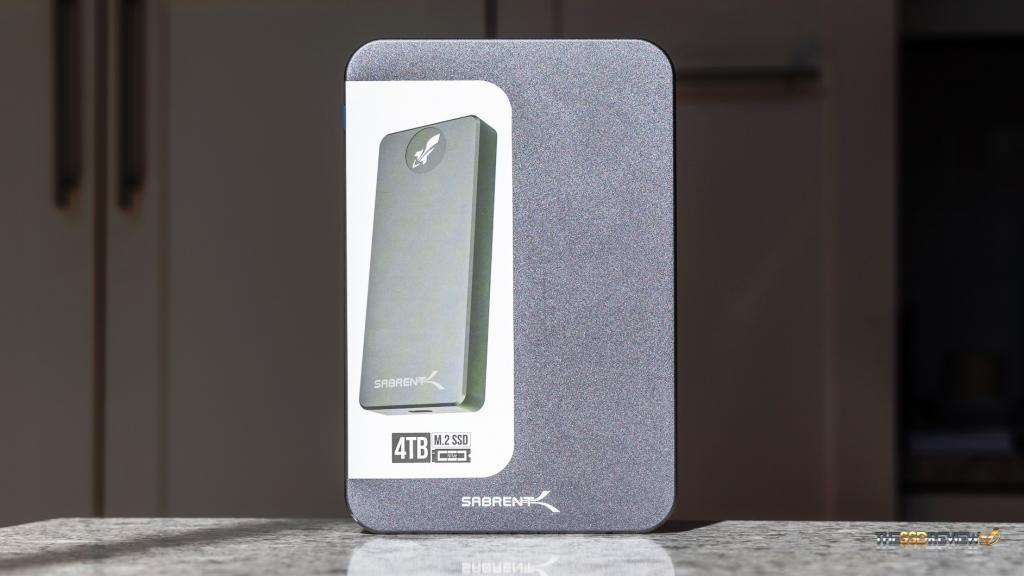Perhaps the one thing that Sabrent has done best in the SSD industry is to fill the void that many would not. They struck hard on entry with capacities that many might not chance, jumping into QLC well ahead of the curve, and then marketing PCIe 4.0 performance at what appeared to be the perfect time. And if you are looking for a portable SSD, you might be just a bit careless if you overlooked Sabrent as they have flat out marketed some of the best in the industry, the 8TB Thunderbolt 3 XTRM-Q being my personal favorite but the Rocket Nano we looked at last week was just as impressive. This week we are going to take a close look at the Sabrent Rocket Pro 4TB NVMe Portable SSD.
The Sabrent Rocket Pro is a portable NVMe SSD that is available in capacities of 256GB, 512GB, 1,2,and 4TB, the 4TB of which we are looking at today. It is a USB 3.2 Gen 2 SSD that will reach speeds of 1GB/s read and write if you have a compatible system that contains Type-C connectivity.
If you have an older system, the Rocket Pro is fully backwards compatible to USB 3.0 or USB 3.1, as well as being compatible with both PC and Mac systems. The Sabrent Rocket Pro also comes with a standard one-year warranty, which jumps to two years if you register the product within 90 days of purchase.
The packaging is typical of Sabrent, and easily the best in the industry as they continue to ship all of their products in a very attractive aluminum clamshell type enclosure. Inside you find an instruction manual, Type-C to Type-C cable, Type-C to Type-A cable, as well as the Rocket pro Portable SSD itself.
The Sabrent Rocket Pro is cast from a solid block of aluminum, its main purpose being thermal protection where it pulls heat away from the internal M.2 SSD and keeps it cool. It is a flat silver in color with the logo on the front, and USB Type-C port on the end where it sits.
It measures 7.5 x 5.2 0.69 inches and has silicon rubber feet on the bottom to protect the surface that it might be sitting on. Checking Amazon, we see the Rocket Pro priced at $79.99 (256GB), $87.05 (512GB), $149.99 (1TB), $279.99 (2TB), and $899,99 (4TB), an we are rather comfortable in stating that price is definitely reflective of quality and performance.
 The SSD Review The Worlds Dedicated SSD Education and Review Resource |
The SSD Review The Worlds Dedicated SSD Education and Review Resource | 


“It is a USB 3.2 Gen 2 SSD that will reach speeds of 1MB/s read and write if you have a compatible system that contains Type-C connectivity.”
It seems like it can do nearly 1000x that speed according to the later pages of the review. 😉
Congratulations! We often covertly disguise the proper spelling of a word to appear improper in order to confirm that, in fact, we still have readership.
Lol…Thanks for the heads up.
You sure do still have a readership. I’ve been checking in here almost every day to see what you have reviewed or published since before you (Sean) reviewed the Crucial MX100 way back when, which is why I bought one (and am still using).
Which brings me to a question for you, Les. I am going to build a new computer based on an AMD processor; however I’m going to install a Linux OS on it instead of Windows. Is there a chance you can keep in mind Linux compatibility when you are doing reviews and writing new articles? Probably most hardware is compatible. Unfortunately they won’t create hardware (SSD) utilities for Linux.
A while back I had thought about asking you to consider writing a SSD optimization guide for Linux, however I figured the BIOS section would remain the same, and since SSDs are getting so fast that the Linux OS part may not be very important.
Thanks for all of the hard work that you continue to do, I definitely appreciate it.
Thank you very much for the comps. Linux. I am sorry but that is not a skill I have in my toolbox, unfortunately.
“Sabrent’s build quality for all of their external SSDs is beyond reproach”
That’s a big stretch, IMO. The machining of their enclosures is great, and the packaging of their drives is really nice, but the 8TB XTRM-Q was released with a serious hardware design flaw. Despite the fact that it only affected some – not all – units, unqualified praise for their build quality is, I believe, uncalled for.
And that’s coming from someone who owns four 4TB XTRMs, one 4TB XTRM-PRO, and two 8TB XTRM-Qs. (Speaking of which, you don’t find the direct to QLC speed to be a significant downside? Perhaps it’s just my use case, which involves very large file transfers, but any time I transfer a significant amount of data the R/W speed drops to what it actually is: somewhere around 300 MB/s.)
For our specific scenario, not a stretch whatsoever. We haven’t got multiple of the same item on hand and have to draw opinion from what we receive and, well, our samples have been beyond reproach. We haven’t encountered or heard of a design flaw. As for QLC R/W speeds dropping, this falls into what we always say about understanding the task at hand for the drive being purchased. We use the 8TB without issue, but understand that if we are going to be moving 2/3/4TB of media in one shot it is going to slow. Don’t get me wrong. I appreciate your comment, but simply have to put out in print my opinion as a reviewer without influence one way or another.